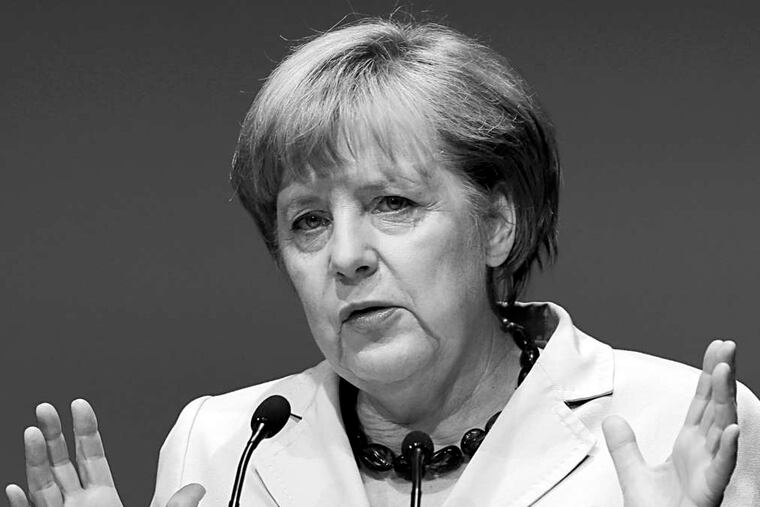Similarities, differences of 2 German leaders
The "German Problem" has returned. Just as the Germany that Bismarck, the Iron Chancellor, first unified in 1870 dominated the Europe of its time, so, too, the unified Germany of today under the "Gray Mouse" dominates the European Union.

The "German Problem" has returned. Cartoons of Angela Merkel in Nazi uniform appear at anti-austerity demonstrations from Dublin to Málaga. Once again, a German chancellor decides on the economic future of the largest economy in the world. Just as the Germany that Bismarck, the Iron Chancellor, first unified in 1870 dominated the Europe of its time, so, too, the unified Germany of today under the "Gray Mouse" dominates the European Union.
The two chancellors held office nearly a century and a half apart. Otto von Bismarck became Prussian minister-president on Sept. 22, 1862, and resigned from all offices March 20, 1890, a span of nearly 28 years. On Nov. 22, 2005, Merkel became federal chancellor. She was the first female chancellor, the first chancellor from the former German Democratic Republic, and, at 51, the youngest person to be so elected.
In appearance, one could not imagine a greater contrast. Bismarck was a bear of a man - overweight, overconfident, and overbearing. Merkel works by indirection and understatement. She wears little makeup and her clothes are studiously unstylish. When she first became a cabinet minister, her colleagues called her "the Gray Mouse." She rose because her opponents underestimated her and she knew it. Nobody does now.
Beneath the obvious differences, however, are uncanny similarities. Both Merkel and Bismarck grew up in the Prussian countryside. Both were born to Protestant families. In Merkel's case, her father, the Rev. Horst Kasner (1926-2011), was a pastor who left the comfort of Hamburg to bring the word of God to communist East Germany. Bismarck embraced his Christianity with renewed fervor in the 1840s. Yet, as the careers of the two chancellors unfolded, religion faded.
Both proved lucky in their patrons. Bismarck's success rested on his brilliance, flair for publicity, and constant intrigues at court. He had a public of one: King William I, who put up with Bismarck's drama and deceit for 26 years. Merkel got to the top by chance. After the unification in 1990, Chancellor Helmut Kohl picked Merkel for his cabinet because she was a woman and East German.
Kohl lost the election of 1998, and then he and his deputy, Wolfgang Schäuble (now Merkel's finance minister), were accused of receiving illegal campaign contributions. Merkel wrote an op-ed on Dec. 22, 1999, in which she called for the party to free itself from Kohl and Schäuble. She betrayed her patrons and got away with it.
What Bismarck really wanted, not even his biographer can say. Merkel, too, has always kept her intentions and desires to herself. Franz Müntefering, one of Merkel's ministers, called her "Pilot Merkel": "You get on the plane. All the conditions are perfect; the machine is in excellent working order. The only problem is: You don't know where you are going."
The differences between the chancellors are equally important and reassuring. Bismarck unified Germany as minister-president of the Kingdom of Prussia by three wars in the 1860s - by "blood and iron," as he put it. He then governed the new Germany for 20 more years. Yet his power rested on the will of an autocratic king, later emperor, who combined the sovereign power of the Kingdom of Prussia and the German Empire.
Bismarck's king lived to be 91, and he always gave in to the temper tantrums, resignations, and hypochondria of his brilliant "servant." The new Germany of the 1870s turned into the most modern, most efficient, best-educated, best-armed state in Europe. It frightened its neighbors, as the Germany of Merkel does today. The neighbors were right. By 1914, Bismarck's Germany had become a "battleship without a rudder."
Merkel's power rests on proportional representation in politics, a "social-market economy" that limits liberal, free-enterprise capitalism, and Germany's position as the "Prussia" of the European Union.
Her support comes from the rank and file. She invented "regional conferences," at which she answers questions from ordinary citizens. A journalist described the sessions as "an office hour with the 'Mommy' of the nation." The conferences bypass the hierarchy of the Christian Democratic Party, and her approval ratings run way above it.
Merkel has made herself unbeatable at home and shrugs off unpopularity abroad. The future of the European Union rests on her shoulders. One day, Europe and the world will appreciate her contribution.
For more information, visit http://jonathansteinbergbismarck.eventbrite.com.